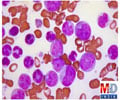
‘Understanding how ibrutinib drug develops resistance in mantle cell lymphoma could help in finding new ways for making it an even better drug.’
Tweet it Now
The research study by Eduardo Sotomayor, MD, director of the George Washington University Cancer Center and Jianguo Tao, MD, PhD, senior member of Cancer Biology and Evolution Program at Moffitt Cancer Center as details on how lymphoma cells are acquiring the resistance."Not all patients will react to a drug in the same way," said Sotomayor. "Some will take it and no longer show symptoms of lymphoma. In others, they may not show a response to the treatment at all, and in other, after an initial response to treatment, the lymphoma may come back more aggressive than before. What we wanted to understand is: How can we make this treatment work for everyone?"
In the past, those diagnosed with mantle cell lymphoma received chemotherapy and monoclonal antibody treatments, which often led to a number of side effects. Some patients are now treated with ibrutinib, a daily pill that has been associated with significant positive response by lymphoma patients. Sotomayor and his research team wanted to understand the lymphoma cells and the mechanisms that allow them to develop resistance to the drug.
"As shown in the past by Dr. Tao's group, mantle cell lymphoma cells depend on strong interactions with the microenvironment for progression. Rather than focus on the cells themselves, our team was concerned about understanding the microenvironment where the cells thrive and find protection," Sotomayor explained. "We need to look at the tumor cells in the context of the microenvironment to understand how they build up resistance."
The team noticed that when ibrutinib shut down the bruton tyrosine kinase pathway that the lymphoma cells thrived in, the cells adapted and began to activate another pathway, noted in the study as PI3K-AKT-mTOR. This allowed the cancer cells to come back, in some cases as more aggressive. Not only did the cells adapt to the drug, they adapted to its effects on the space around them and adapted the microenvironment facilitating further progression. Exploring methods for inhibiting the pathways and resistance networks would be a next step in finding a way to make ibrutinib an even better drug for more patients.
Advertisement
Source-Eurekalert









